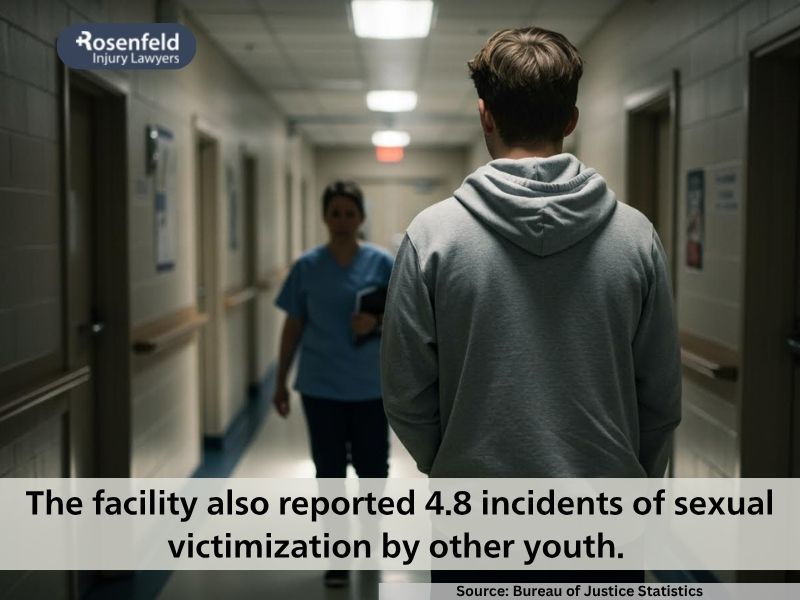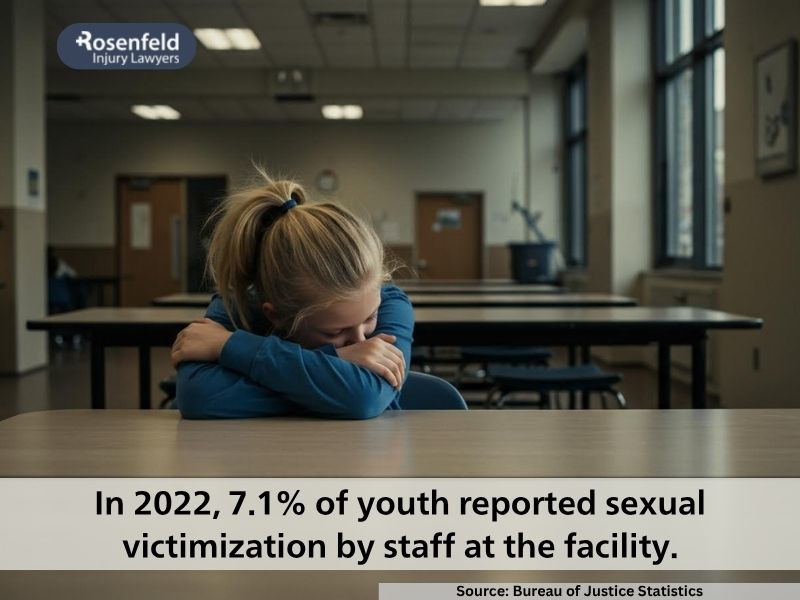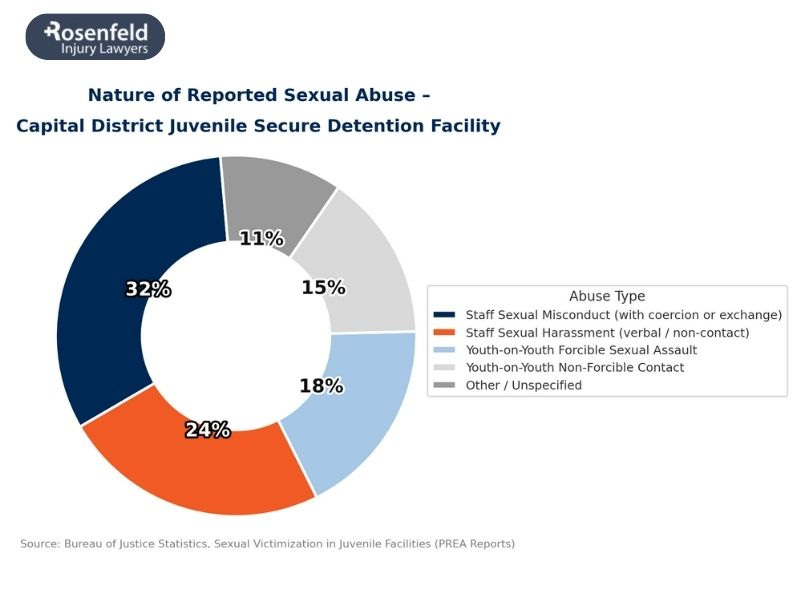Capital District Juvenile Secure Detention Facility Sexual Abuse Lawsuits
Compensation for Victims of Abuse at New York Juvenile Detention Centers
At Injury Lawyer Team, we stand with survivors of Capital District Juvenile Secure Detention Facility sexual abuse and fight for their right to justice. Our attorneys have extensive experience handling New York juvenile detention center sexual abuse lawsuits, and we know how to hold both individual abusers and the institutions that failed to protect children accountable.
When young people are placed in a New York juvenile detention facility, families expect safety, supervision, and rehabilitation. Instead, too many young victims suffer physical and sexual abuse at the hands of staff members or in environments made dangerous by systemic neglect. We help survivors pursue compensation, expose misconduct, and ensure their voices are finally heard.

Allegations of Staff Misconduct and Systemic Failures at CDYCI
The Capital District Juvenile Secure Detention Facility has faced a disturbing record of staff misconduct, systemic neglect, and tragic outcomes for the children entrusted to its care. These cases reveal how fragile the well-being of young people becomes when juvenile detention centers fail to provide adequate staffing, proper medical care, and meaningful oversight.
Sexual Abuse Allegations Against Staff
One of the most widely reported cases came in June 2021, when former employee Michesha Cancer, 28, was arrested and charged with third-degree rape for sexually abusing a resident inside the secure detention facility.
Prosecutors alleged that Cancer engaged in repeated sexual acts with a detained youth while employed by Berkshire Farm Center/Together for Youth, the private operator contracted to run the facility.
This alleged sexual abuse underscored the dangers of inadequate supervision and lax hiring practices in a juvenile detention facility. For young victims, staff members hold enormous power, and when oversight fails, the risk of exploitation and misconduct is profound.
The Death of Caprist McBrown
In October 2022, the facility again made headlines when 19-year-old Caprist McBrown was found unresponsive in his room. His family later filed a civil lawsuit, alleging that staff members with multiple prior felony convictions had smuggled fentanyl into the facility and failed to perform mandatory safety checks in the days leading up to McBrown’s death.
The allegations were later confirmed when former employee Michael Dunsmore, 48, was arrested in October 2024 and pleaded guilty to criminally negligent homicide. Although the family’s lawsuit was ultimately resolved, the settlement amount was not disclosed.
This tragedy highlights misconduct by individual staff members as well as the dangers of inadequate staffing and the failure to enforce security policies inside secure detention.
Pattern of Significant Incidents
These events are part of a larger, ongoing pattern. According to Justice Center oversight records, the Capital District facility has reported more than two dozen significant incidents of abuse and neglect since 2016.
These included:
- Physical abuse by staff against detained youth.
- Sexual misconduct involving inappropriate staff-youth contact.
- Inappropriate restraints leading to injury and trauma.
- Failures to provide behavioral health services and medical care to children in crisis.
A 2024 audit by the New York State Comptroller confirmed these failures, noting that clinical assessments and safety procedures at state-operated and privately managed facilities were dangerously deficient, leaving youth exposed to harm.
Child Victims Act Litigation
Further legal exposure came through claims filed under this milestone act. In one publicized case, the state sought to reclaim $50,000 in settlement funds linked to alleged staff sexual abuse of a child in custody at the Capital District Juvenile Secure Detention Facility.
While relatively small in dollar amount, this case illustrates how widespread and longstanding the allegations of childhood sexual abuse have become at the facility.
A Systemic Failure
Taken together, these cases paint a picture of systemic breakdowns in New York’s juvenile justice system. Instead of providing safety and rehabilitation, the Capital District Juvenile Secure Detention Facility became a setting where youth endured physical and sexual abuse, inadequate medical care, and neglect by staff who should have protected them.
These statistics represent lives forever altered by childhood sexual abuse in a facility that was supposed to protect their safety and future.
What Laws Govern Sexual Abuse Cases Involving New York Juvenile Detention Facilities?
Survivors of abuse in a juvenile detention center have powerful legal protections under both state and federal law. These statutes guide how misconduct is defined, reported, and prosecuted, and they also shape the claims we bring in juvenile detention center sexual abuse lawsuits.
- New York Penal Law Article 130 defines sexual offenses such as sexual abuse, sexual misconduct, and rape. The statute was updated in September 2024 to modernize the definition of “sexual contact,” strengthening protections for young victims.
- Social Services Law §413 requires teachers, counselors, medical staff, and residential employees to act as mandated reporters, notifying authorities of suspected child abuse.
- 18 NYCRR Part 432 governs how Child Protective Services investigates reports of abuse or neglect within facilities.
- Executive Law Article 20 and SSL §488 (Protection of People with Special Needs Act) created the Justice Center, which oversees facilities run by state agencies and investigates significant incidents of abuse and neglect involving vulnerable populations.
- At the federal level, the Prison Rape Elimination Act (PREA) sets mandatory standards for preventing, detecting, and responding to sexual abuse in juvenile detention centers.
Together, these laws provide the framework for holding staff, administrators, and agencies accountable when children are sexually abused in custody.

Who Can Be Held Liable for Childhood Sexual Abuse at a Juvenile Detention Facility?
In juvenile detention center sexual abuse lawsuits, multiple parties may be held accountable depending on the facts of the case. Survivors are not limited to pursuing claims against the individual abuser, and liability often extends to the institutions that created or allowed unsafe conditions.
Potential defendants include:
- The individual abuser — staff, counselors, or contractors who directly engaged in sexual misconduct or physical trauma against a child.
- Supervisors and administrators — those who failed to properly supervise staff, ignored red flags, or allowed inappropriate restraints, subpar staffing, or unsafe practices to continue.
- The facility operator — private organizations such as Berkshire Farm Center/Together for Youth, or other entities contracted to run detention facilities and group homes.
- The Capital District Youth Center, Inc. (CDYCI) — the nonprofit entity responsible for managing the Capital District Juvenile Secure Detention Facility.
- New York state agencies — including the Office of Children and Family Services (OCFS) and the Justice Center, when oversight failures allowed abuse to occur in facilities ran or licensed by the state.
- Third-party contractors — providers of behavioral health therapy, security, or medical care who contributed to neglect or failed to protect a child’s safety.
By naming all responsible parties, our firm ensures survivors of childhood sexual abuse have the best chance of securing accountability and full compensation.
How Long Do Victims Have to File Civil Lawsuits in New York?
One of the most important questions we address with survivors is how long they have to take legal action. In New York, the sexual abuse statute of limitations is among the most survivor-friendly in the nation, thanks to the Child Victims Act (CVA).
Under CPLR §208(b), survivors of childhood sexual abuse now have the right to file a civil lawsuit until the age of 55. This reform dramatically expanded access to justice for people who were previously time-barred, recognizing that many victims cannot come forward until decades after the abuse.
For those abused as adults, different limitations periods apply, but for claims arising in a juvenile detention center or other state-operated settings, the CVA provides critical protection. Even if the alleged abuse took place years ago, survivors may still have the ability to pursue accountability against staff members, private operators, or New York state agencies.
Our firm carefully reviews each client’s timeline under the current statute to ensure no opportunity for justice is lost.
What Damages Can Survivors of Sexual Abuse Recover?
Survivors of sexual abuse in a youth detention facility can pursue a wide range of damages through civil lawsuits. These damages are designed to compensate for the harm suffered and provide resources for long-term recovery.
In successful cases, survivors may recover compensation for:
- Medical expenses — coverage for emergency treatment, ongoing medical care, and future health needs related to physical or sexual abuse.
- Therapy and counseling costs — payment for psychological support, trauma therapy, and behavioral health treatment necessary for healing.
- Pain and suffering — damages for the emotional distress, humiliation, and trauma caused by sexual misconduct, inappropriate restraints, or physical trauma.
- Loss of quality of life — recognition of the long-term impact on relationships, education, employment, and overall well-being.
- Lost wages and reduced earning capacity — compensation if the abuse or its aftermath prevents survivors from working or advancing in their careers.
- Punitive damages — in cases of egregious misconduct, additional financial penalties may be awarded to punish the abuser and deter future misconduct by staff members and facilities operated by the state or private contractors.
By seeking these damages, survivors can secure the resources they need to rebuild their lives and hold accountable those who enabled or committed the abuse.

How Injury Lawyer Team Can Help
At Injury Lawyer Team, we know how devastating it is when a child is sexually abused inside a juvenile detention center. Survivors deserve justice and guidance from attorneys who understand the sensitive nature of these cases and how to navigate the complex legal system.
When you come to us with a potential New York sexual abuse lawsuit, we provide:
- Confidential case evaluations — we listen to your story in a safe, private setting and explain your legal options.
- Thorough investigation — our team gathers facility records, staffing logs, medical files, Justice Center reports, and testimony to establish liability.
- Identification of all liable parties — including the individual abuser, supervisors, private contractors such as Berkshire Farm Center, and agencies responsible for oversight.
- Statute of limitations review — we carefully apply federal and state law, as well as the sexual abuse statute of limitations, to ensure your case is filed on time.
- Litigation and negotiation — whether through trial or settlement, we aggressively pursue maximum compensation for medical costs, therapy, lost opportunities, and pain and suffering.
- Trauma-informed advocacy — we work with sensitivity, protecting your privacy while making sure your voice is heard.
Our mission is to hold accountable those who allowed abuse in New York juvenile detention centers and to help survivors secure the resources needed to rebuild their lives.
Book a Free Consultation
If you or someone you love was sexually assaulted in the Capital District or other facilities specializing in juvenile detention in New York, know that you are not alone. At Injury Lawyer Team, we are dedicated to representing survivors in sexual abuse lawsuits and fighting to hold both abusers and institutions accountable.
Your voice matters. Our consultations are 100% free and completely confidential. There is no obligation, and you will never pay us anything unless we win compensation for you. This first step is about understanding your rights, exploring your legal options, and giving you the safe space you deserve to share your story.
Contact us today to schedule your free consultation. We are here to stand with you, to fight for justice, and to ensure your pain is never ignored again.
All content undergoes thorough legal review by experienced attorneys, including Jonathan Rosenfeld. With 25 years of experience in personal injury law and over 100 years of combined legal expertise within our team, we ensure that every article is legally accurate, compliant, and reflects current legal standards.








